GALLUP NEWS SERVICE
PRINCETON, NJ -- President Bush's Monday night address on Iraq was delivered to an American audience that has thus far been highly supportive of him personally, and in general agreement with the possibility of invading Iraq and removing Saddam Hussein from power. But the same public tuned in with important doubts about whether the United States has done all it can to resolve the Iraq situation diplomatically, and with reservations about the advisability of taking on Iraq unilaterally, without the support of America's allies or the United Nations. Despite Bush's popularity, Americans continue to say that Congress, not Bush, should have the ultimate say over whether the United States invades Iraq. And despite Americans' support for the invasion, particularly under the right conditions, only a third of likely voters indicate they will be more likely to vote for their congressional incumbents if they vote in favor of sending U.S. troops to Iraq.
Recent Gallup polling also shows that Americans have a fairly high tolerance for U.S. casualties in a potential war with Iraq -- to a certain point. If the estimated number of casualties reaches 5,000, a majority of Americans would oppose invading Iraq with U.S. ground troops.
Here, in more detail, are the 10 most significant findings about American public opinion and the situation in Iraq.
1. Majority Still Supports Iraq Invasion
According to the latest CNN/USA Today/Gallup Poll, conducted Oct. 3-6, 2002, 53% of Americans say they favor invading Iraq with U.S. ground troops in an attempt to remove Saddam Hussein from power. This support level is slightly lower than last month's. In late September 57% of the public favored invading Iraq, and 38% were opposed.
It should be noted that the recent drop in support for invading Iraq mirrors a drop seen earlier this summer, when the percentage favoring military intervention fell from 61% in June to 53% in August. Thus, it is not clear that public support is currently slipping -- perhaps it simply varies between roughly 50% and 60%, depending on the state of public debate over the war.
| Public Support for Invading Iraq 2001-2002 |
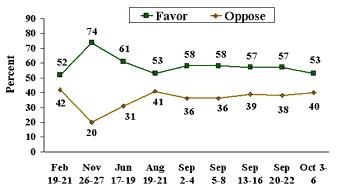 |
2. Support is Politicized
Unlike the spirit of nonpartisanship that characterized public reaction to the Sept. 11 terrorist attack, Republicans and Democrats differ markedly today over whether or not the United States should invade Iraq. A solid majority of Republicans back Bush's proposal to invade Iraq, with 70% in favor and only 24% opposed. By contrast, a majority of Democrats (52%) oppose the initiative, with only 43% in favor. Political independents' attitudes usually fall squarely between Republicans' and Democrats', but in this case they lean toward the Democratic side. Just under half of independents, 48%, favor invading Iraq, while 44% are opposed.
Last November, Republicans and Democrats were much more unified in the belief that the United States should send troops back to the Persian Gulf to remove Saddam from power. A poll conducted Nov. 26-27 found 74% of Americans, overall, in favor -- including 82% of Republicans and 69% of Democrats.
3. Public May Need More Explanation From Bush
In galvanizing the public behind invading Iraq, Bush faces the challenge of convincing more Americans that U.S. diplomatic options have been exhausted. According to the latest survey, only 46% of Americans believe this is the case, and 49% believe the United States could still do more to solve the crisis with Iraq diplomatically.
The public's frame of mind on this question contrasts sharply with how they felt about the Iraq crisis in January 1991, just before the war began. At that time, 60% of Americans felt the United States had done all it could to avoid war through diplomatic means.
Do you think the United States has done all it can do to solve the crisis with Iraq diplomatically, or not?
|
Yes, has |
No, has not |
No opinion |
|
|
National Adults |
|||
|
2002 Oct 3-6 |
46% |
49 |
5 |
|
1991 Jan 11-13 |
60% |
33 |
7 |
Also, although Americans generally approve of the job President Bush is doing on Iraq (64% in Gallup's Sept. 20-22 survey), they are dubious about whether his administration has a clear and well thought out policy to deal with the situation. Only 46% believe the Bush administration's Iraq policy is clear and well thought out; 48% disagree.
The president obviously intended to change these sentiments in his Monday night speech in Cincinnati, and it will be important to update these trends in the near future to measure their impact.
4. Potential for Casualties Impacts Support Level
A series of questions in the latest survey tests Americans' tolerance for sustaining U.S. casualties in a future invasion of Iraq -- the results suggest that Americans are fairly tolerant of the prospect.
Fifty-one percent of Americans say they would favor invading Iraq with U.S. ground troops under the assumption that it would result in 100 U.S. casualties. That support level is only slightly lower than the 53% who favor the invasion in general.
The prospect of 1,000 U.S. casualties (similar to the roughly 800 in the 1991 Gulf War) sends this support only slightly lower, to 46%, with 48% opposed. Only when Gallup tests the impact of 5,000 U.S. casualties does the poll find a solid majority of Americans, 60%, opposed to invading Iraq.
|
Would you favor or oppose invading Iraq with U.S. ground troops in an attempt to remove Saddam Hussein from power if you knew that there would be (number) U.S. casualties?
|
|||
|
100 Casualties |
1,000 Casualties |
5,000 Casualties |
|
|
Favor |
51% |
46 |
33 |
|
Oppose |
42% |
48 |
60 |
5. Allied, U.N. Backing are Prerequisites of Public Support
Public support for sending U.S. ground troops to Iraq is highly contingent on the role that U.S. allies and the United Nations play in sanctioning and participating in the invasion. If the United Nations sanctions the invasion, or if other countries join with the United States in sending troops, then public support could soar to nearly 80%. On the other hand, without these elements, a majority of Americans generally say the United States should not invade Iraq. Only 38% would favor an invasion if the United States has to do it alone, and 37% favor it if the United Nations were opposed.
This point of view is, of course, quite different from the congressional resolution recently passed by the U.S. House of Representatives -- "The President is authorized to use the Armed Forces of the United States as he determines to be necessary and appropriate in order to defend the national security of the United States against the continuing threat posed by Iraq." The resolution is expected to sail through the U.S. Senate in the next week or two.
|
Range of Support for U.S. Military Action Against Iraq Sep 20-22, 2002 |
||
|
|
|
|
|
% |
% |
|
|
If other countries participate in invading Iraq |
79 |
18 |
|
If the United Nations supports invading Iraq |
79 |
19 |
|
If Congress supports invading Iraq |
69 |
28 |
|
If the United States has to invade Iraq alone |
38 |
59 |
|
If the United Nations opposes invading Iraq |
37 |
58 |
|
If Congress opposes invading Iraq |
37 |
59 |
6. Support Will Be There at Beginning of War
Regardless of the specifics, President Bush can probably count on the American public to rally around his decision should he eventually authorize an invasion -- at least initially. Just under half the public, 47%, currently say they would give their unequivocal support for Bush, that is, stand behind the military action, because they basically support the decision to invade Iraq. But an additional 27% say they would support Bush's decision while disagreeing with it -- presumably an expression of perceived patriotism on their part. Only 22% of Americans say they would withhold support from Bush because they do not think the United States should invade Iraq.
| Reaction to U.S. Invasion of Iraq 1) You would support the president's decision because you think the U.S. should invade Iraq, 2) You would support the president's decision even though you do not think the U.S. should invade Iraq, or 3) You would not support the president's decision because you do not think the U.S. should invade Iraq? |
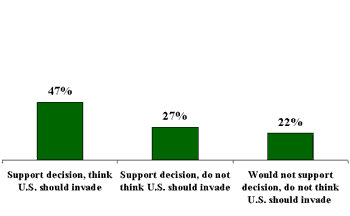 |
| Oct 3-6, 2002 |
7. Bush Approval Remains High
The new poll finds President Bush's job performance rating holding steady in the high 60s, where it has been since July. His current 67% approval rating is nearly identical to the 66% recorded in late September.
There is only a five-point gender gap in support for the president, with 70% of men and 65% of women approving of the job he is doing. There are no strong generational differences, as between 63% and 71% of all age groups approve. Larger, but standard, differences are seen according the partisan orientation of respondents. More than nine in 10 Republicans (95%) approve of Bush, versus 64% of independents and only 45% of Democrats.
| George W. Bush's Job Approval Rating |
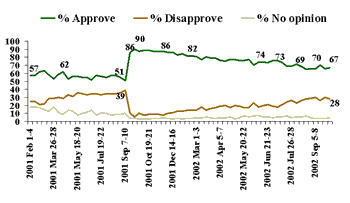 |
8. Public Rejects First Strike in General, But Favors It for Iraq
Gallup finds Americans have a double standard when it comes to the U.S. first-strike policy. By a 51% to 40% margin, the public says that, in general, the United States should not attack another country unless that country has attacked the United States first. But when asked specifically about Iraq, two-thirds of Americans (66%) say the United States should be able to attack Iraq out of concern of being attacked; just 29% say the United States should not attack Iraq first.
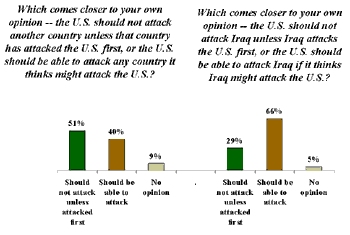 |
| Oct 3-6, 2002 |
This inconsistency suggests that Americans may make a distinction between the kind of threat that any country might pose to the United States, and the threat posed by Iraq, with the latter perhaps being more palpable and immediate. This distinction may mean that, despite Americans' reservations that U.S. diplomacy has not done enough to solve the weapons inspections issue, the public would be likely to back President Bush in the event he launches a pre-emptive strike against Iraq.
9. Economy Versus Terrorism Continue to Compete for Public's Concern
With the economy struggling, the stock market tumbling, and the Democrats promising to draw the public's attention to their dwindling 401-(k) accounts before Election Day, the outcome of the midterm congressional elections could hinge on whether the economy or the Iraq crisis is uppermost in voters' minds. The closer the United States gets to taking military action, the higher the stakes become for both issues, a fact underscored by the Dow's plunge yesterday to a new multi-year low. The sell-off was partly attributed to Wall Street jitters over Bush's Iraq speech.
The latest CNN/USA Today/Gallup Poll asked respondents to identify the issue that would be most important to them in their vote for Congress this November. Among the six issues listed in the survey, the economy and war with Iraq were essentially tied (at 25-24%) for the top issue.
More generally, foreign policy concerns -- including the Iraq situation and the war on terrorism -- account for 38% of all responses to this question. Domestic concerns -- including the economy, Social Security/Medicare, healthcare and education -- account for 57%.
| Thinking about the elections for Congress this November, which ONE of the following issues is MOST important to you when you think about your vote for Congress this year -- economic conditions, education, healthcare, the possibility of war with Iraq, Social Security and Medicare, or terrorism? |
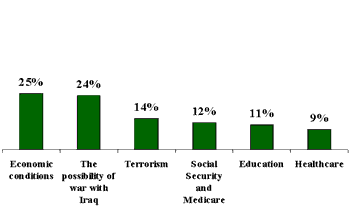 |
| Oct 3-6, 2002 |
A recent question asking Americans to make a direct comparison between the economy and the possibility of war with Iraq also shows that the two issues are about equally important to voters. However, as can be seen from the trend line below, the relative importance of Iraq as an election issue has increased in recent weeks.
Thinking ahead to the elections for Congress this November, if you had to choose, which of the following issues will be more important to your vote -- [ROTATED: economic conditions, (or) the possibility of war with Iraq]?
|
|
Possibility of war with Iraq |
|
|
|
|
|
|
2002 Sep 20-22 |
42% |
49 |
7 |
1 |
* |
1 |
|
2002 Sep 2-4 |
57% |
34 |
7 |
* |
0 |
2 |
|
2002 Aug 19-21 |
55% |
36 |
7 |
* |
* |
2 |
10. Impact on Congressional Races Remains Unknown
Previous Gallup polling has shown that if the pivotal campaign issue is Iraq, or terrorism more broadly, then Republicans win. In Gallup's late September poll, 52% of voters chose the Republicans as the party better able to handle the issue of war with Iraq; only 33% named the Democrats for this. The two parties are split more evenly on the economy issue, with 46% of voters choosing the Democrats as the party better able to handle it, and 41% choosing the Republicans.
However, among the subgroup of Americans for whom Iraq is the more important voting issue, the Democrats are slightly more likely to be seen as the party better able to handle the issue, by a 43% to 37% margin over the Republicans.
A separate question is what damage a member of Congress might do to his or her candidacy by opposing President Bush in the war on Iraq. Bush's widespread popularity and the strong public support behind anti-terrorism efforts present a daunting hurdle for members who might otherwise raise their voices or cast their vote against invading Iraq.
In fact, the latest Gallup data confirms an earlier finding that, in general, members' position on the decision to send U.S. troops to Iraq is not going to be a major factor in their re-election. About a third of likely voters (34%) say they are more likely to vote for their representative from Congress if he or she votes for invasion. But, countering that, a substantial number (25%) say they are more likely to vote for their representative if that person votes against sending ground troops to Iraq. The remaining 41% have no opinion or say the issue will make no difference to their vote.
| Would you be more likely to vote for your representative from Congress if that person voted -- [ROTATED: in favor of sending ground troops to Iraq, (or if that person voted) against sending ground troops to Iraq] -- or would it not make a difference to your vote either way? |
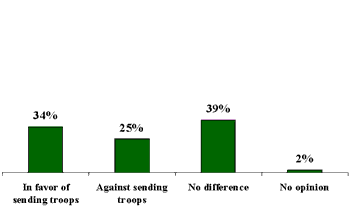 |
| Likely Voters, Oct 3-6, 2002 |
Survey Methods
These results are based on telephone interviews with a randomly selected national sample of 1,402 adults, 18 years and older, conducted Oct. 3-6, 2002. For results based on this sample, one can say with 95 percent confidence that the maximum error attributable to sampling and other random effects is plus or minus 3 percentage points. In addition to sampling error, question wording and practical difficulties in conducting surveys can introduce error or bias into the findings of public opinion polls.
Would you favor or oppose invading Iraq with U.S. ground troops in an attempt to remove Saddam Hussein from power?
|
Favor |
Oppose |
No opinion |
||
|
% |
% |
% |
||
|
National Adults |
||||
|
2002 Oct 3-6 |
53 |
40 |
7 |
|
|
2002 Sep 20-22 ^ |
57 |
38 |
5 |
|
|
2002 Sep 13-16 † |
57 |
39 |
4 |
|
|
2002 Sep 5-8 ^ † |
58 |
36 |
6 |
|
|
2002 Sep 2-4 † |
58 |
36 |
6 |
|
|
2002 Aug 19-21 † |
53 |
41 |
6 |
|
|
2002 Jun 17-19 ^ † |
61 |
31 |
8 |
|
|
2001 Nov 26-27 ‡ |
74 |
20 |
6 |
|
|
2001 Feb 19-21 ‡ |
52 |
42 |
6 |
|
|
1993 Jun 29-30 ‡ |
70 |
27 |
3 |
|
|
1992 Mar 30-Apr 5 ‡ ? |
55 |
40 |
5 |
|
|
Likely Voters |
||||
|
2002 Oct 3-6 |
47 |
46 |
7 |
|
|
^ |
Asked of half sample. |
|||
|
† |
WORDING: Would you favor or oppose sending American ground troops to the Persian Gulf in an attempt to remove Saddam Hussein from power in Iraq? |
|||
|
‡ |
WORDING: Would you favor or oppose sending American troops back to the Persian Gulf in order to remove Saddam Hussein from power in Iraq? |
|||
|
? |
Life Magazine/Gallup |
|||
Do you think the United States has done all it can do to solve the crisis with Iraq diplomatically, or not?
|
Yes, has |
No, has not |
No opinion |
|
|
National Adults |
|||
|
2002 Oct 3-6 |
46% |
49 |
5 |
|
1991 Jan 11-13 |
60% |
33 |
7 |
|
Likely Voters |
|||
|
2002 Oct 3-6 |
45% |
51 |
4 |
If President Bush decided to invade Iraq with U.S. ground troops in an attempt to remove Saddam Hussein from power, which of the following would best describe your reaction -- [ROTATED: you would support the president's decision because you think the U.S. should invade Iraq, you would support the president's decision even though you do not think the U.S. should invade Iraq, (or) you would not support the president's decision because you do not think the U.S. should invade Iraq]?
|
|
Support |
Would not support decision, |
|
|
|
National Adults |
||||
|
2002 Oct 3-6 |
47% |
27 |
22 |
4 |
|
Likely Voters |
||||
|
2002 Oct 3-6 |
42% |
30 |
25 |
3 |
In your view, who should have the final authority for deciding whether the United States should invade Iraq with ground troops -- [ROTATED: Congress (or) President Bush]?
BASED ON --752-- NATIONAL ADULTS IN FORM A
BASED ON --400-- LIKELY VOTERS IN FORM A
|
Congress |
Bush |
DEPENDS (vol.) |
No opinion |
|
|
National Adults |
||||
|
2002 Oct 3-6 |
54% |
40 |
2 |
4 |
|
Likely Voters |
||||
|
2002 Oct 3-6 |
54% |
38 |
3 |
5 |
Would you be more likely to vote for your representative from Congress if that person voted -- [ROTATED: in favor of sending ground troops to Iraq, (or if that person voted) against sending ground troops to Iraq]-- or would it not make a difference to your vote either way?
BASED ON --750-- NATIONAL ADULTS IN FORM B
BASED ON --406-- LIKELY VOTERS IN FORM B
|
In favor of sending troops |
Against |
|
No |
|
|
National Adults |
||||
|
2002 Oct 3-6 |
33% |
22 |
40 |
5 |
|
2002 Sep 13-16 ^ |
26% |
16 |
56 |
2 |
|
Likely Voters |
||||
|
2002 Oct 3-6 |
34% |
25 |
39 |
2 |
|
^ Asked of a full sample. |
||||
. Would you favor or oppose invading Iraq with U.S. ground troops in an attempt to remove Saddam Hussein from power if you knew that – [ITEMS A-C ASKED OF SPLIT SAMPLE]?
A. There would be 100 U.S. casualties
BASED ON --503-- NATIONAL ADULTS IN FORM X
BASED ON --282-- LIKELY VOTERS IN FORM X
|
Favor |
Oppose |
No opinion |
|
|
National Adults |
|||
|
2002 Oct 3-6 |
51% |
42 |
7 |
|
Likely Voters |
|||
|
2002 Oct 3-6 |
50% |
42 |
8 |
B. There would be 1,000 U.S. casualties
BASED ON --523-- NATIONAL ADULTS IN FORM Y
BASED ON --262-- LIKELY VOTERS IN FORM Y
|
Favor |
Oppose |
No opinion |
|
|
National Adults |
|||
|
2002 Oct 3-6 |
46% |
48 |
6 |
|
Likely Voters |
|||
|
2002 Oct 3-6 |
43% |
51 |
6 |
C. There would be 5,000 U.S. casualties
BASED ON --476-- NATIONAL ADULTS IN FORM Z
BASED ON --262-- LIKELY VOTERS IN FORM Z
|
Favor |
Oppose |
No opinion |
|
|
National Adults |
|||
|
2002 Oct 3-6 |
33% |
60 |
7 |
|
Likely Voters |
|||
|
2002 Oct 3-6 |
40% |
57 |
3 |
Thinking about how the parties are handling the possibility of war with Iraq, which political party do you think is more concerned about gaining political advantage rather than doing what is in the best interests of the country -- [ROTATED: the Republican Party, the Democratic Party,] both parties equally, or neither party?
BASED ON --752-- NATIONAL ADULTS IN FORM A
BASED ON --400-- LIKELY VOTERS IN FORM A
|
Republican |
Democratic |
Both |
Neither |
No opinion |
|
|
National Adults |
|||||
|
2002 Oct 3-6 |
35% |
32 |
15 |
7 |
11 |
|
Likely Voters |
|||||
|
2002 Oct 3-6 |
38% |
37 |
15 |
5 |
5 |
Which comes closer to your own opinion -- [ROTATED: the U.S. should not attack another country unless that country has attacked the U.S. first, (or) the U.S. should be able to attack any country it thinks might attack the U.S.]?
BASED ON --752-- NATIONAL ADULTS IN FORM A
BASED ON --400-- LIKELY VOTERS IN FORM A
|
Should not attack unless attacked first |
Should be |
No |
|
|
National Adults |
|||
|
2002 Oct 3-6 |
51% |
40 |
9 |
|
Likely Voters |
|||
|
2002 Oct 3-6 |
50% |
41 |
9 |
Which comes closer to your own opinion -- [ROTATED: the U.S. should not attack Iraq unless Iraq attacks the U.S. first, (or) the U.S. should be able to attack Iraq if it thinks Iraq might attack the U.S.]?
BASED ON --750-- NATIONAL ADULTS IN FORM B
BASED ON --406-- LIKELY VOTERS IN FORM B
|
Should not attack unless attacked first |
Should be |
No |
|
|
National Adults |
|||
|
2002 Oct 3-6 |
29% |
66 |
5 |
|
Likely Voters |
|||
|
2002 Oct 3-6 |
31% |
64 |
5 |
Do you think the Bush administration has a clear and well-thought out policy on Iraq, or not?
BASED ON --492-- NATIONAL ADULTS IN FORM A
|
Yes, has |
No, does not |
No opinion |
|
|
2002 Sep 20-22 |
46% |
48 |
6 |
Do you approve or disapprove of the way George W. Bush is handling the situation with Iraq?
BASED ON --518-- NATIONAL ADULTS IN FORM B
|
Approve |
Disapprove |
No opinion |
|
|
2002 Sep 20-22 |
64% |
34 |
2 |
* -- Less than 0.5%
